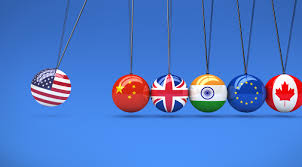W.B.C.S. Examination Notes On – Indian Foreign Policy – History.
WBCS পরীক্ষার নোট – ভারতীয় বিদেশ নীতি – ইতিহাসের নোট।
AFTER eight years of independence India’s foreign policy still gives rise to grave doubts in the Western mind. The reason for this is the acceptance of old definitions rather than an appreciation of the country’s background and its human aspirations. The word “neutrality” as applied to India’s foreign policy has little meaning. Like a hundred other oft-repeated words it has become blunted with use, and can be related to India only in the context of her past and present policies. What does neutrality–or, as we prefer to call it, non-alignment–mean and why does India follow this path.Continue Reading W.B.C.S. Examination Notes On – Indian Foreign Policy – History.
As in dress, there are fashions in political outlook and behavior and the individual who wears last year’s model at a gathering is regarded not only as eccentric but something approaching a freak. India, it would seem, has entered the elegant international drawing room in old clothes and is an embarrassing misfit among those already assembled there. Why does she continue to embarrass the leaders of society when they have pointed out to her that she would be far more acceptable if she were fashionably in step with them?
In our assessment of the world situation, we, like other nations, find ourselves confronted by two alternatives. One is the belief that peace can be maintained by building up military might and held in balance by an armaments race. The other is the view that it can be preserved only by peaceful means, that the armaments race endangers its preservation, and that no stone must be left unturned to lessen the tensions that exist in the world. To us it seems logical that the latter is the surer way to safeguard the peace. Our approach to peace might then be called “neutrality” if such a nebulous word can be used to define a policy which since its inception in an independent India has been both active and dynamic. In essence our neutrality is the unjaundiced outlook we choose to apply to all international issues, believing.However, with changing times and its own requirement the perspective of Indian foreign policies have changed considerably. From NAM to inclination and 20 years treaty with USSR; from survival to assertion of authority in South Asia (as evident in the liberation of Bangladesh); from reliance on foreign powers for arms and ammunitions to being a nuclear power and from a marginal country to a leading country in G20, India’s perspective as well as aspirations have been changing to formulate and change its foreign policy to cater to the changing world and changing times. India has been increasingly becoming proactive and vocal in the external arena. Having already proven its worth in regional authority, it now aspires to play and has been playing a superpower role in the world forum.
India, has fast emerged as a force to reckon with on international platform. Third largest economy, massive military strength, important members and leaders of various international forum and presence across the planet require India’s foreign policy to be robust, sustainable and effective. India aspires to be the world leader of this century on its own merit and strength. Hence, a well crafted meticulous foreign policy is the need of the hour to cater to following aspirations of India:
1. Permanent seat of United Nations Security Council
2. Membership of groups like NSG, Australian group, Wassenar arrangement etc.
3. Resolving its international border issues with negotiations.
4. Say and importance in organizations like Arctic Council, G20, World Bank, IMF etc.
5. Molding WTO so as to benefit India’s agriculture and services sector along with other developing nations.
Our Neighbours
India’s neighbour had been a part of a homogenous culture prevailing in the Indian subcontinent for last five thousand years. India, along with its neighbours as have been organized in SAARC form a unique region and culture of the world. However, in spite of the close proximity in culture, region, aspirations and values India’s relationship with its neighbours have been far from satisfactory.
India’s neighbours include Nepal, Bhutan, Bangladesh, Myanmar, Sri Lanka, Pakistan, Afghanistan and Maldives, which are bounded by SAARC barring Myanmar. India defines its extended neighbourhood as China, Mongolia, South Korea, Japan, Thailand, Laos, Cambodia, Vietnam, Philippines, Brunei, Singapore, Malaysia, Indonesia, Australia, New Zealand, Mauritius, Iran, Gulf countries and so on. It is a member of various groups having regular interactions with its neighbours as in BIMSTEC, Mekong Ganga Cooperation, East Asia Summit, Shanghai Cooperation Organization, IOR and so on.
Apart from the economy and trade cooperation, India also aspires to have warm relation with its neighbours and extended neighbours in the field of education, health, fighting terrorism, disaster management, employment for its citizens, curbing organized crimes, technology development and so on. Though, India has not had massive success vis-a-vis the cooperation with its neighbours, but still it is gradually coping up the pace to enahnce affinities with its neighbours with increasing engagement and proactiveness. India has picked up the pace to reflect the maxim – “The closer geographically, economically and culturally relations you have, the greater is the need for closer interaction and reconfiguration of foreign policy and strategic interests.
Our own publications are available at our webstore (click here).
For Guidance of WBCS (Exe.) Etc. Preliminary , Main Exam and Interview, Study Mat, Mock Test, Guided by WBCS Gr A Officers , Online and Classroom, Call 9674493673, or mail us at – mailus@wbcsmadeeasy.in
Visit our you tube channel WBCSMadeEasy™ You tube Channel
Please subscribe here to get all future updates on this post/page/category/website



 Toll Free 1800 572 9282
Toll Free 1800 572 9282  mailus@wbcsmadeeasy.in
mailus@wbcsmadeeasy.in


















































































































